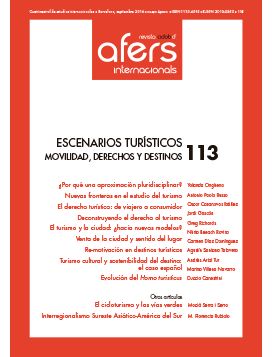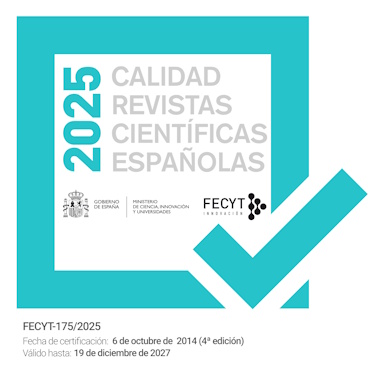The new frontiers of the study of tourism: conceptual and epistemological challenges
Keywords:
tourism, tourism studies, paradigms, epistemologies, interstices, transdisciplinary approachesAbstract
Revista CIDOB d’Afers Internacionals, nº 113
Quadrimestral (May-September 2016)
ISSN:1133-6595 | E-ISSN:2013-035X
DOI: https://doi.org/10.24241/rcai.2016.113..15
This article introduces the significant changes tourism studies has undergone in recent decades, describing its path from the margins of the social sciences to the centre and a place at the intersection of its parent disciplines. To face the numerous unresolved issues of tourism development and the new challenges presented by a liquid, mobile society – a society of travellers, experts and connected persons – academia has turned to new paradigms. On the one hand these allow new fundamental questions about tourism to be asked, displacing the focus of the research from the tourist and the industry to their practices, the material nature of the space in which they act, and the network of relations that they weave when creating a tourist site, while on the other hand a range of new analytical methods are articulated. This article re-examines and explores the respective nuances of those paradigms and proposes a menu of research subjects and issues arising from them.
>> The full text articles of this issue are available only in Spanish language
References
Amin, Ash. «Spatialities of globalisation». Environment and planning A, vol. 34, n.º 3 (2002), p. 385-399.
Amin, Ash y Thrift, Nigel. Cities: reimagining the urban. Cambridge: Polity Press, 2002.
Arias Sans, Albert y Quaglieri Domínguez, Alan. «Unravelling Airbnb: Urban Perspectives From Barcelona», en: Russo, Antonio Paolo y Richards, Greg (eds.). Reinventing the local in tourism. Clevedon: Channel View, 2016, p. 209-228.
Atkinson, Rowland. «Introduction: misunderstood saviour or vengeful wrecker? The many meanings and problems of gentrification». Urban Studies, vol. 40, n.º 12 (2003), p. 2.343-2.350.
Baerenholdt, Jørgen Ole; Haldrup, Michael; Larsen, Jonas y Urry, John. Performing tourist places. Aldershot: Ashgate Publishing Ltd., 2004.
Benson, Angela M. (ed.). Volunteer tourism: Theoretical frameworks and practical applications. Londres: Routledge, 2010.
Bialski, Paula. «Technologies of hospitality: How planned encounters develop between strangers». Hospitality & Society, vol. 1, n.º 3 (2012a), p. 245-260.
Bialski, Paula. Becoming intimately mobile. Frankfurt: Peter Lang, 2012b.
Bianchi, Raoul V. «Migrant tourist-workers: exploring the “contact zones” of postindustrial tourism». Current Issues in Tourism, vol. 3, n.º 2 (2000), p. 107-137.
Britton, Stephen G. «The political economy of tourism in the Third World». Annals of tourism research, vol. 9, n.º 3 (1982), p. 331-358.
Brouder, Patrick. «Creative outposts: tourism’s place in rural innovation». Tourism Planning & Development, vol. 9, n.º 4 (2012), p. 383-396.
Butler, Richard (ed.). The tourism area life cycle. Clevedon: Channel View Publications, 2006.
Byung-Chul, Han. «Why Revolution Is Impossible: On The Seductive Power Of Neoliberalism». Süddeutsche Zeitung International, 2014 (en línea) [Fecha de consulta: 17.10.2015] http://international.sueddeutsche.de/post/97371820645/why-revolution-is-impossible-on-the-seductive
Cohen, Erik. «Who is a tourist? A conceptual clarification». Sociological Review, vol.22, n.º 4 (1974), p. 527-555.
Crang, Mike y Thrift, Nigel J. Thinking space. Londres: Routledge, 2000. d’Hauteserre, Anne-Marie. «Postcolonialism, colonialism, and tourism», en: Hall, Colin Michael; Lew, Alan y Williams, Allan M. (eds.). A companion to tourism. Oxford: Blackwell Pub., 2004, p. 235-245.
Degen, Mónica y García, Marisol. «The transformation of the “Barcelona model”: an analysis of culture, urban regeneration and governance». International journal of urban and regional research, vol. 36, n.º 5, 2012, p. 1.022-1.038.
Edensor, Tim. «Staging tourism: Tourists as performers». Annals of Tourism Research, vol. 27, n.º 2 (2000), p. 322-344.
Edensor, Tim. «Mundane mobilities, performances and spaces of tourism». Social & Cultural Geography, vol. 8, n.º 2 (2007), p. 199-215.
Edensor, Tim. Tourists at the Taj: Performance and meaning at a symbolic site. Londres: Routledge, 2008.
Estévez Villarino, Brais. «La idea de espacio público en geografía humana. Hacia una conceptualización (crítica) contemporánea». Documents d’anàlisi geogràfica, vol. 58, n.º 1 (2012), p. 137-163.
Evans, Graeme. «Creative spaces, tourism and the city», en: Richards, Greg y Wilson, Julie (eds.). Tourism, Creativity and Development. Londres: Routledge, 2007, p. 57-72.
Feifer, Maxine. Going places. Londres: MacMillan, 1985.
Franck, Karen y Stevens, Quentin (eds.). Loose space: possibility and diversity in urban life. Londres: Routledge, 2013.
Franklin, Adrian. Tourism: An Introduction. Londres: Sage, 2003.
Frenzel, Fabian y Koens, Ko. «Slum tourism: developments in a young field of interdisciplinary tourism research». Tourism geographies, vol. 14, n.º 2 (2012), p. 195-212.
Haldrup, Michael y Larsen, Jonas. Tourism, Performance and the Everyday: Consuming the Orient. Londres: Routledge, 2009.
Hall, Colin Michael. Tourism: Rethinking the social science of mobility. Harlow: Prentice Hall, 2005.
Hannam, Kevin. «Tourism geographies, tourist studies and the turn towards mobilities». Geography Compass, vol. 2, n.º 1 (2008), p. 127-139.
Hannam, Kevin. «The end of tourism? Nomadology and the mobilities paradigm», en: Tribe, John (ed.). Philosophical issues in tourism. Clevedon: Channel View Publications, 2009, p. 55-70.
Hannigan, John. Fantasy city: Pleasure and profit in the postmodern metropolis. Londres: Routledge, 2005.
Haug, Bente; Dann, Graham MS y Mehmetoglu, Mehmet. «Little Norway in Spain: From tourism to migration». Annals of Tourism Research, vol. 34, n.º 1 (2007), p. 202-222.
Hollinshead, Keith. «Tourism and third space populations», en: Coles, Tim E. y Timothy, Dallen J. (eds.). Tourism, Diasporas and Space. Londres: Routledge, 2004, p. 33-49.
Jóhannesson, Gunnar Thór. «Tourism translations: Actor–Network theory and tourism research». Tourist Studies, vol. 5, n.º 2 (2005), p. 133-150.
Landry, Charles. The Creative City: A toolkit for urban innovators. Londres: Earthscan, 2000.
Larsen, Jonas. «Tourism mobilities and the travel glance: experiences of being on the move». Scandinavian Journal of Hospitality and Tourism, vol. 1, n.º 2 (2001), p. 80-98.
Li, Yiping y Hu, Zhiyi. «Red Tourism in China». Journal of China tourism research, vol. 4, n.º 2 (2008), p. 156-171.
MacCannell, Dean. The Tourist: A New Theory of the Leisure Class. Londres: Macmillan, 1976.
Maitland, Robert. «Everyday life as a creative experience in cities». International Journal of Culture, Tourism and Hospitality Research, vol. 4, n.º 3 (2010), p. 176-185.
Mansfeldt, Ole Kjaer. The Inbetweenness of Tourist Experiences. Tesis de doctorado, Copenhagen: The Royal Danish Academy of Fine Arts, School of Design, 2014.
Martinotti, Guido. Metropoli. Nuova morfolgoia sociale della citta. Bolonia: Il Mulino, 1993.
Massey, Doreen B. Space, Place, and Gender. Minneapolis: University of Minnesota Press, 1994.
Minca, Claudio y Oakes, Tim. Real Tourism: Practice, Care and Politics in Contemporary Travel Culture. Londres: Routledge, 2011.
Molz, Jeannie Germann. Travel connections: Tourism, technology and togetherness in a mobile world. Londres: Routledge, 2012a.
Molz, Jeannie Germann. «CouchSurfing and network hospitality:’It’s not just about the furniture’». Hospitality & Society, vol. 1, n.º 3 (2012b), p. 215-225.
Owens, Lynn. «From tourists to anti-tourists to tourist attractions: the transformation of the Amsterdam squatters’ movement». Social Movement Studies, vol. 7, n.º 1 (2008), p. 43-59.
Pappalepore, Ilaria y Smith, Andrew. «The Co-Creation of Urban Tourism Experiences», en: Russo, Antonio Paolo y Richards, Greg (eds.). Negotiating the local in tourism. Clevedon: Channel View, 2016, p. 87-99.
Pine, B. Joseph y Gilmore, James H. The experience economy: work is theatre & every business a stage. Cambridge, MA: Harvard Business Press, 1999.
Pratt, Andy C. «Creative cities: the cultural industries and the creative class». Geografiska annaler: series B, human geography, vol. 90, n.º 2 (2008), p. 107-117.
Pratt, Andy C. «The cultural contradiction of the creative city». City, Culture and Society, vol. 2, n.º 3 (2011), p. 123-130.
Quaglieri Domínguez, Alan y Russo, Antonio Paolo. «Paisajes urbanos en la época post-turística. Propuesta de un marco analítico». Scripta Nova. Revista Electrónica de Geografía y Ciencias Sociales, vol. xiv, n.º 323 (10 de mayo de 2010) (en línea) http://www.ub.es/geocrit/sn/sn-323.htm
Ren, Carina. «Non-human agency, radical ontology and tourism realities». Annals of Tourism Research, vol. 38, n.º 3 (2011), p. 858-881.
Richards, Greg. «Creativity and tourism: The state of the art». Annals of Tourism Research, vol. 38, n.º 4 (2011), p. 1.225-1.253.
Richards, Greg y Raymond, Crispin. «Creative tourism». ATLAS News, vol.23 (2000), p. 16-20.
Richards, Greg y Wilson, Julie (eds.). Tourism, Creativity and Development. Londres: Routledge, 2007.
Russo, Antonio Paolo. «Branding Brazilian slums through “freeware” cultural production: the case of Rio de Janeiro», en: Go, Frank y Govers, Robert (eds.). International Place Branding Yearbook 2012: Managing Smart Growth and Sustainability. Basingstoke-Nueva York: Palgrave Macmillan, p. 174-186.
Russo, Antonio Paolo y Arias Sans, Albert. «Student communities and landscapes of creativity: how Venice – “the world’s most touristed city” – is changing». European Urban and Regional Studies, vol. 16, n. º 2 (2009), p. 175-189.
Russo, Antonio Paolo y Capel-Tatjer, Laura. «From citadels of education to cartier latins (and back?). The changing landscapes of student populations in European cities». Geography Compass, vol. 1, n.º 5 (2007), p. 1.160-1.189.
Russo, Antonio Paolo y Quaglieri Domínguez, Alan. «La lógica espacial del intercambio de casas: una aproximación a las nuevas geografías de lo cotidiano en el turismo contemporáneo». Scripta Nova. Revista Electrónica de Geografía y Ciencias Sociales, vol. xviii, n.º 483 (2014) (en línea) http://www.ub.es/geocrit/sn/sn-483.htm
Russo, Antonio Paolo y Van der Borg, Jan. «An urban policy framework for culture-oriented economic development: lessons from the Netherlands». Urban Geography, vol. 31, n.º 5 (2010), p. 668-690.
Salazar, Noel B. «Imaged or Imagined? Cultural representations and the ‘tourismificaiton’ of people and places». Cahiers d’études africaines, vol. XLIX, n.º 193-194 (2009), p. 49-72.
Sheller, Mimi y Urry, John. Tourism mobilities: places to play, places in play. Londres: Routledge, 2004.
Smith, Valene L. (ed.). Hosts and Guests: The Anthropology of Tourism. Philadelphia: University of Pennsylvania Press, 1989.
Smith, Melanie K. y Zátori, Anita. «Re-Thinking Host-Guest Relationships In The Context Of Urban Ethnic Tourism», en: Russo, Antonio Paolo y Richards, Greg (eds.). Negotiating the local in tourism. Clevedon: Channel View, 2016, p. 129-150.
Thrift, Nigel. Non-representational theory: Space, Politics, Affect. Londres: Routledge, 2007.
Urry, John. Sociology Beyond Societies: Mobilities for the twenty-first century. Londres: Routledge, 2000.
Urry, John y Larsen, Jonas. The Tourist Gaze 3.0. Londres: Sage, 2011.
Van der Duim, René. «Tourismscapes: an actor-network perspective». Annals of Tourism Research, vol. 34, n.º 4 (2007), p. 961-976.
Van der Duim, René; Ren, Carina y Jóhannesson, Gunnar Thór (eds.). ActorNetwork Theory and Tourism: Ordering, Materiality and Multiplicity. Londres: Routledge, 2012.
Williams, Allan M. y Hall, Colin Michael. «Tourism and migration: new relationships between production and consumption». Tourism Geographies, vol. 2, n.º 1 (2000), p. 5-27.
Zukin, Sharon. «Urban lifestyles: diversity and standardisation in spaces of consumption». Urban studies, vol. 35, n.º 5-6 (1998), p. 825-839.













